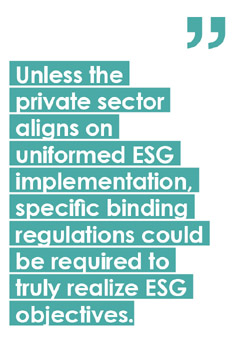Spelling out ESG
ESG is an acronym for Environmental, Social, and Governance matters, and is widely applied in several areas including investment, corporate, and regulatory. Although ESG lacks a singular, globally defined scope, it is broadly interpreted to include, for example, “E-” climate change, natural resources, biodiversity, “S-” human rights, labor conditions, diversity and inclusion, broad stakeholder relations, and “G-” corporate governance, transparency and disclosure, and compensation.
ESG is not, as commonly perceived, directly synonymous with CSR, SRI, Corporate Sustainability, or Impact Investing. While there are certain overlaps between such concepts, ESG is distinctive.
CSR is a management concept whereby management incorporates environmental and social concerns of a broad set of stakeholders into its business activities with the aim of creating better outcomes for its stakeholders, not only shareholders. SRI practices divert investments away from objectionable activities and into ethical opportunities, while Impact Investing actively deploys capital to aggressively produce a positive environmental or societal impact in addition to profit.
A more targeted approach
ESG, however, refers to the makeup or analysis of a company’s specific environmental, social, and governance practices. Broadly speaking, whereas concepts like CSR and SRI may be prescriptive and aspirational in nature, ESG is descriptive and helps enable specific, calculable analysis.
Thus, while under a CSR strategy, a company may aspire to “conduct operations with a minimal environmental footprint and maximize diversity among leadership,” for example, ESG would entail an analysis of exactly how much carbon a company’s operations emit into the environment and the demographic data of the board members and senior leadership.

Standardizing ESG
ESG has existed since 2005 after gaining notoriety through the UN Global Compact report “Who Cares Wins,” but there are no currently agreed single set of ESG factors or disclosure standards. Investors have therefore struggled to objectively measure ESG factors and make an apples-to-apples comparison between companies or investment options. Many blame the lack of universal ESG standards for contributing to “greenwashing,” a practice of merely virtue signaling green or ethical behavior.
Unless the private sector aligns on uniformed ESG implementation, specific binding regulations could be required to truly realize ESG objectives. Although numerous distinctive non-governmental global initiatives exist with the aim of harmonizing ESG, securing universal buy-in to a single approach seems unlikely, if not impossible in today’s globalized business world.
EU leads, but U.S. seeks to engage
The EU is widely viewed as leading the charge on regulatory ESG. Recent and developing ESG regulations, such as the Pensions Directive and the EU Commission’s Sustainable Finance Disclosure Regulation and Taxonomy Regulation, are already having a direct impact on how businesses and investors operate.
On the U.S. side, ESG seems poised to make advancements under the new Biden administration. President Biden’s “Executive Order on Climate-Related Financial Risk” has particularly helped reposition climate change as a central U.S policy focus. The Executive Order principally directs federal agencies to take broad action concerning climate-related financial risks. It also directs the U.S. Secretary of Labor to consider proposing a rule by September 2021 to address certain rules adopted by the Department of Labor under the Trump Administration which had chilling effects on positive ESG advancement.
Also, on June 16, 2021, the U.S. House of Representatives, by a razor-thin margin, passed the “Corporate Governance Improvement and Investor Protection Act,” a bill comprised of a legislative package already approved by the Financial Services Committee. This legislative package promotes corporate environmental and social responsibility and particularly includes the “ESG Disclosure Simplification Act,” an act which would require the SEC to create a standard definition of ESG metrics and mandate that the SEC require standardized ESG disclosures, the “Greater Accountability in Pay Act,” and the “Climate Risk Disclosure Act.” Many doubt the bill will pass the U.S. Senate, but the bill’s passage in the House, coupled with President Biden’s climate-related Executive Order, suggests pro-ESG changes may ultimately be in store for the U.S. In fact, notwithstanding the fate of the legislative package, the SEC has already signaled its intent to consider ultimately promulgating wider ESG disclosures in addition to new climate-related disclosures anticipated to be released by the SEC before the end of the year.
Although many U.S. companies would prefer private initiative over express regulation, many nevertheless welcome ESG related objectives. Some businesses and commercial groups have already supported a transition to a new long-term business approach compatible with ESG. One prominent example is the U.S. Business Roundtable’s Statement on the Purpose of a Corporation, which was applauded by the U.S. Chamber of Commerce, a close affiliate of AmCham Slovakia. The statement, among other things, calls for a change from shareholder primacy to stakeholder capitalism, and for a transition from a short-term view to a stewardship of long-term well-being for broadly defined stakeholders. It was signed by 181 CEOs of U.S. leading companies, many of which, or their affiliates, are members of AmCham Slovakia.
All things considered, trends indicate ESG is not a fad, but an opportunity to be embraced for societal and financial gain.
Anthony P. Hernandez, Of Counsel, Barger Prekop s.r.o.
Jake Slegers, International Business Relations Manager, Barger Prekop s.r.o.




Follow us